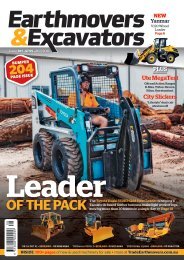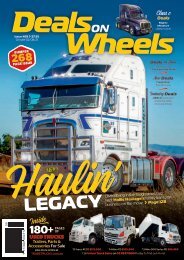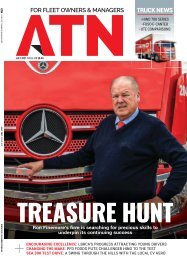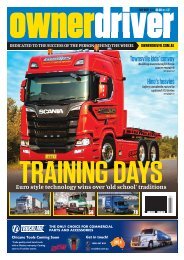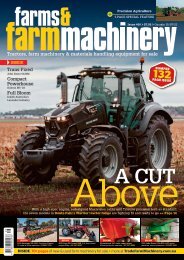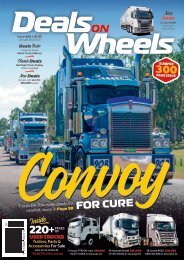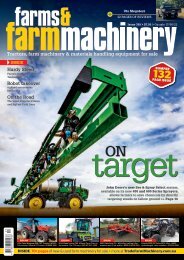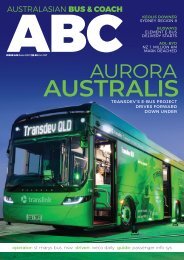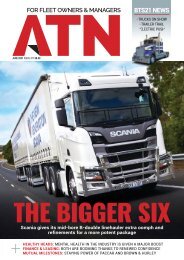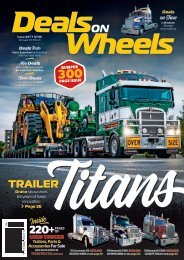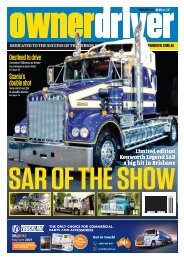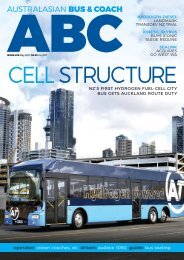Farms & Farm Machinery #401
You also want an ePaper? Increase the reach of your titles
YUMPU automatically turns print PDFs into web optimized ePapers that Google loves.
News<br />
nue<br />
REPAIR<br />
Mods not so hot<br />
Modifications to farm equipment should not be treated in the same way as a farmer’s right to<br />
repair, the Tractor and <strong>Machinery</strong> Association of Australia says. By Anthony Wingard<br />
A round-table discussion between the National<br />
<strong>Farm</strong>ers’ Federation (NFF), the Tractor and<br />
<strong>Machinery</strong> Association of Australia (TMA) and<br />
other relevant parties will soon be underway as the<br />
agricultural sector aims to find a solution on farmers’<br />
and repairers’ right to repair.<br />
TMA executive director Gary Northover says<br />
the discussions will aim to achieve a ‘final position’<br />
between all parties, including concerns raised by<br />
the TMA on the matter.<br />
“We’ve begun the process of reaching out to the<br />
NFF, for instance, to develop a bit of a round-table<br />
working discussion around this so that we can<br />
hopefully develop some guidelines which might be<br />
applied to the standards and expectations that the<br />
market is looking for,” says Northover.<br />
“It’s certainly early days but it’s a path that both of<br />
us believe we wish to pursue. So, we look forward<br />
to working the NFF, the Productivity Commission<br />
and also the ACCC [Australian Competition and<br />
Consumer Commission] in just trying to get that<br />
balance right.”<br />
The discussions are set to take place following<br />
reports released by both the Productivity Commission<br />
and ACCC earlier this year, which investigated<br />
the growing number of barriers facing farmers<br />
wanting to repair their own equipment.<br />
Both reports highlighted several challenges<br />
for farmers wishing to complete their own<br />
maintenance themselves or through a thirdparty<br />
machinery repairer.<br />
The ACCC report also called for more<br />
independent competition in the repair market<br />
as well as alterations to the current warranties<br />
issued on agricultural machinery.<br />
In response, the TMA outlined its stance in a<br />
statement of principles that referred mainly to the<br />
need to differentiate between the rights of farmers<br />
or third-party repairers to repair machinery and<br />
their right to modify that machinery.<br />
Modification, as outlined in the TMA’s statement<br />
could refer to: resetting immobiliser systems;<br />
reprogramming electronic processing or engine<br />
control units; changing equipment or engine<br />
18 <strong><strong>Farm</strong>s</strong> & <strong>Farm</strong> <strong>Machinery</strong><br />
settings and downloading or accessing the source<br />
code of machines.<br />
Speaking to <strong><strong>Farm</strong>s</strong> & <strong>Farm</strong> <strong>Machinery</strong>, Northover<br />
says it was imperative to differentiate between<br />
the two.<br />
“We certainly recognise the issue of right to repair<br />
and we do support farmers’ ability to maintain and<br />
repair their own equipment,” he says.<br />
“There are a couple of key issues. One is the<br />
difference between the right to repair and the right<br />
to modify.<br />
“We’ve issued some statement of principles that<br />
we think is a starting point on that road to highlight<br />
the sort of things we think third party repairers<br />
ought to be able to do under the right to repair and<br />
the things that may fall under the right to modify.<br />
“That was part of our submission to the ACCC,<br />
but we felt that was a distinction that needed to<br />
be made.”<br />
In relation to the right to modify in the Australian<br />
agricultural machinery industry, however, the<br />
ACCC report explicitly states: “We have not received<br />
evidence indicating that this practice is widespread,<br />
or that it is a significant motivation for independent<br />
repairers.”<br />
That said, it did confirm some submissions had<br />
raised concerns about the increased possibility<br />
of software modification should independent<br />
repairers have access to diagnostic software and<br />
other technical data.<br />
That notion has been refuted by the TMA, which<br />
suggests the practice of modification by third-party<br />
repairers is in fact widespread and was the main<br />
reason why it objected to recommendations.<br />
“It is prevalent and we see many examples where<br />
engines are being chipped to perform beyond the<br />
stated capacity. If you look at what is happening<br />
elsewhere in the world as well, this is not just an<br />
isolated example,” says Northover.<br />
“Machines being chipped can mean they perform<br />
above their stated capacity, involving sometimes<br />
disengaging the environmental management<br />
equipment, [which] can lead to safety concerns as<br />
far as we are concerned.<br />
“So, while the ACCC might not have called out the<br />
right to modify as a risk as such, we know that it is.<br />
Our members are conscious of their obligations to<br />
ensure that machines are operated safely.”<br />
DEALER CONCERNS<br />
Northover also raised several other concerns<br />
relating to right to repair and right to modify, such<br />
as the level of training required to perform such<br />
maintenance.<br />
Currently, while specific training and experience<br />
varies between manufacturers, technicians are<br />
required to at least complete specific vocational<br />
TAFE courses that are available in many regions<br />
across the country. Bigger manufacturing brands<br />
also invest in factory-based training for the technicians<br />
as well as sophisticated training departments<br />
in dealerships.<br />
Northover says a shortage of technical labour<br />
in regions and the economic role of the dealer<br />
across the country should also be considered<br />
when discussing the right to repair.<br />
“Walking down the path to right to repair, we<br />
just want to make sure the industry understands<br />
the standards necessary to deliver the minimum<br />
quality of service and make sure the machines<br />
are performing satisfactorily and it doesn’t lead to<br />
knock-on consequences down the track,” he says.<br />
“When the third-party repairer isn’t up to the task,<br />
so to speak, the cost is then up to the customer.<br />
“I know some examples I have heard recently of<br />
only half of positions were advertised last year got<br />
filled and if you apply that across the industry, there<br />
is a distinct shortage of technical labour out there.<br />
“I think the thing to consider as part of all of this<br />
is the role the dealer plays. The dealer has invested<br />
a lot of money in developing their businesses.<br />
In many instances, they are probably the biggest<br />
employer in most of the regional towns that they<br />
are in.”<br />
The Productivity Commission is set to hand down<br />
its final report to the federal government by October<br />
29, including a number of recommendations for the<br />
future of agricultural machinery in Australia.



